Indonesia Elections 2024: Pollsters see Prabowo first-round knockout, but analysts say Anies, Ganjar still in the fight
Opinion surveys might not be representative of population sentiment, and candidates are not ruling out any scenarios regardless of what the figures show, analysts say.
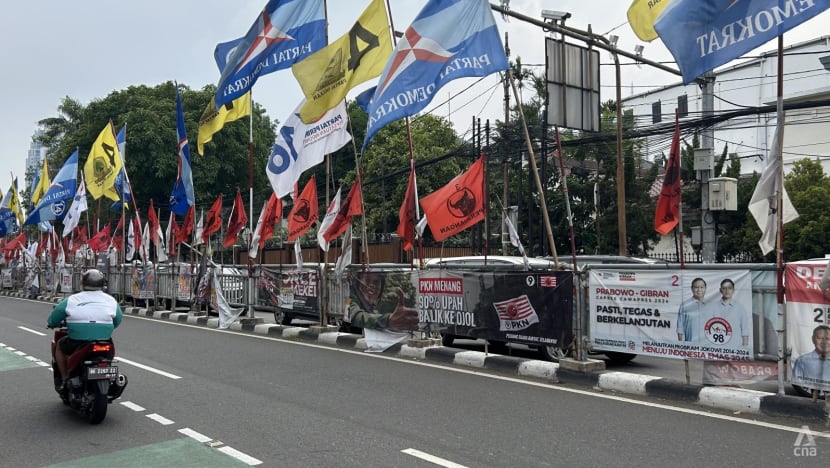
Party flags and candidate banners line a street in Jakarta ahead of the 2024 election. (Photo: CNA/Aqil Haziq Mahmud)

This audio is generated by an AI tool.
JAKARTA: Official campaigning has ended, and a cooling-off period is in place from Sunday till Tuesday for voters to mull over their choices before polling on Wednesday (Feb 14) for Indonesia's next president and legislators.
While the latest opinion polls show that Indonesian presidential election frontrunner Prabowo Subianto could win in one round, analysts say his two other rivals remain in the fight to force a runoff and deny him an easy route to the presidency.
They add that these surveys only poll a small percentage of the voter population and might not reflect actual sentiment on election day.
The final pre-election survey released by the reputable Indikator Politik Indonesia on Friday (Feb 9) showed Mr Prabowo and his running mate Gibran Rakabuming Raka scoring an electability of 51.8 per cent.
Mr Anies Baswedan and Mr Muhaimin Iskandar (24.1 per cent) came in second, while Mr Ganjar Pranowo and Mr Mahfud MD (19.6 per cent) were in third.
The latest surveys by Populi Center (conducted from Jan 27 to Feb 3), Political Weather Station (Jan 21-25), and Lingkaran Survei Indonesia (Jan 16-26) also put the Prabowo-Gibran pairing’s electability at 52.5 per cent, 52.3 per cent and 50.7 per cent respectively.
With three presidential candidates running, the current electoral rules require a candidate to win at least 50 per cent of the national vote and at least 20 per cent of the vote in each province to avoid a runoff.
The runoff will see the first- and second-placed candidates go head-to-head in polls set for Jun 26.
Mr Prabowo’s campaign team told CNA it was cautiously confident of winning in one round but did not discount any possibilities, including working with the third-placed candidate should the election go to a runoff.
Senior members of Mr Anies’ and Mr Ganjar’s campaign said they would not read too much into the latest surveys, and that what matters are the results on Feb 14.
CONFIDENT BUT CAUTIOUS
Indonesia’s Minister of State-Owned Enterprises Erick Thohir, who has appeared alongside Mr Prabowo during mega rallies, told CNA he is confident that Mr Prabowo will win in one round.
State ministers are technically not allowed to campaign, so Mr Erick ensures he takes leave from official duties while campaigning for Mr Prabowo.
“If we look at the surveys, they all say that (it will finish in one round). So, I'm making sure that … for there to (only) be one round, I'm now also campaigning,” he said.
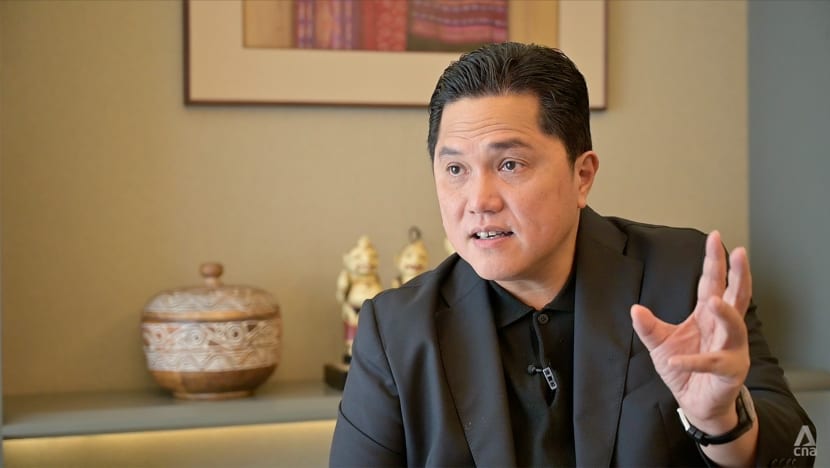
Mr Eddy Soeparno, a spokesperson for Mr Prabowo’s campaign team, told CNA on Feb 7 they are not taking the recent uptick in support for granted.
“We remain very cautious that over the next couple of days, anything can happen - in terms of other candidates accelerating their speed, accelerating their movements, approaching the masses, which we are doing as well,” said Mr Eddy, who is also secretary-general of the National Mandate Party (PAN), one of the parties supporting Mr Prabowo.
Separately, Mr Muhammad Syaugi Alaydrus, who leads Mr Anies’ campaign team, said the thousands who turned up at the “Desak (challenge) Anies” campaign events - where the public can ask the candidate anything - are testament to his burgeoning support.
“Our surveys, as we know, have never transparently conveyed who they are financed by. We know all of that,” he told reporters at a press conference on Thursday.
“Many aspects are considered by Anies-Muhaimin, and surveys are one of them … But there are many other aspects, such as what programs they have, their track record, and whether all their promises have been fulfilled in Jakarta.”
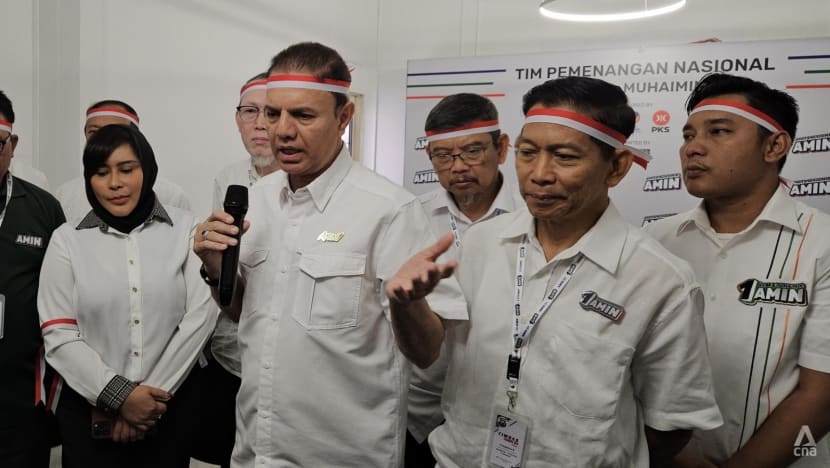
Ganjar-Mahfud campaign team leader Arsjad Rasjid was quoted by Kompas as saying that the people’s voice will be heard on polling day, and not in surveys.
“We also hope that the outcome is a fair, truthful and factual one that follows the democratic process,” he said, reiterating that state apparatus should remain neutral during the hustings.
This comes amid allegations that President Joko Widodo has allowed the deployment of public officers to support Mr Prabowo's campaign and undermine that of his rivals, sparking protests from various groups.
Jokowi, as the popular president is widely known, previously said the head of state is legally allowed to campaign, but on Wednesday told reporters he will not be doing so.
NOT IN THE BAG YET
Dr Ian Wilson, a senior fellow at Murdoch University’s Indo-Pacific Research Centre, told CNA he was wary of the latest Indikator Politik survey as it uses multistage sampling of 1,000 people.
In multistage sampling, a target population is first defined before being divided into smaller and smaller clusters until a desired sample size is achieved.
This method is often used to collect data from a large, geographically spread group of people in national surveys as it is cheaper and easier to conduct, although not the most representative.
“I'm very sceptical of accurate extrapolation using this sample size and method for a voting population of 204 million, especially when everything is so dynamic,” Dr Wilson said.
The analyst said the Prabowo campaign team would at this point have hoped for a convincing first round win “in the bag”, especially with Jokowi seen to be more overtly campaigning over the past few days.
Jokowi has been spotted dining privately with Mr Prabowo on recent occasions and has been accused of mobilising social aid programs to shore up support for the current Defence Minister.
“I think now many of them (in Prabowo’s campaign) are coming to the conclusion that it's probably going to go to a second round,” Dr Wilson added.
Political researcher Wasisto Raharjo Jati told CNA that opinion polls only pick up a small percentage of the hundreds of millions that will head to the polls on Feb 14.
“It could be misleading since the population of survey respondents cannot be comparable with the fixed number of registered voters around Indonesia,” said Mr Wasisto from Indonesia’s National Research and Innovation Agency.
Dr Burhanuddin Muhtadi, a visiting fellow at ISEAS-Yusof Ishak Institute’s Indonesia Studies Programme, wrote in an article published by the institute on Friday that pre-election surveys are imperfect and depend on complex, dynamic parameters with many variables involved.
However, he said these surveys can predict the likelihood of one versus two rounds of voting, with the key determinant being the substantial group of swing and undecided voters.
For instance, he pointed to a mid-January Indikator Politik survey that found that 13.1 per cent of those with an electoral preference for a particular candidate were still very likely to change their vote.
“This casts uncertainty on voting day,” he wrote.
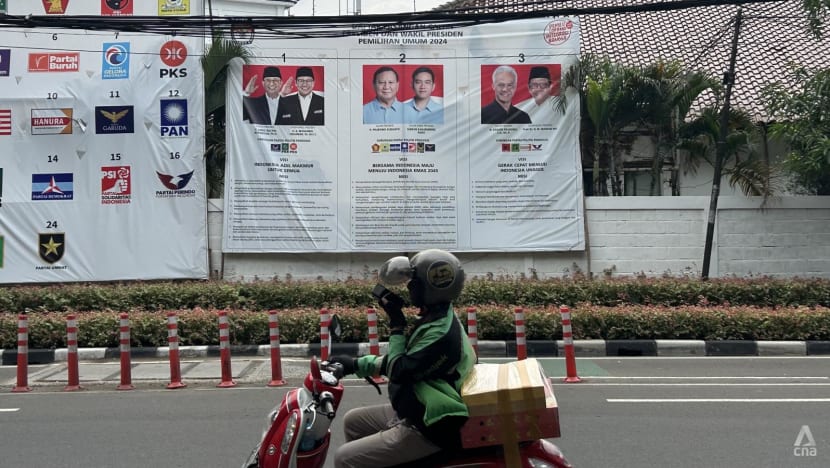
To highlight how this might affect voting patterns, Dr Burhanuddin referred to an Indikator Politik survey released a month before the 2019 presidential election, which saw Jokowi and Ma’ruf Amin take on Mr Prabowo and Sandiaga Uno.
The survey put the Jokowi-Ma’ruf pairing at 55.4 per cent electability, while Prabowo-Sandiaga received 37.4 per cent, with undecided voters at 7.2 per cent.
Jokowi and Mr Ma’ruf subsequently won the election with 55.5 per cent of the vote, while Mr Prabowo and Mr Sandiaga got 44.5 per cent.
While the survey results predicted the correct winner, the actual election results showed that almost all the undecided voters had flocked to Mr Prabowo’s camp, Dr Burhanuddin said.
“If this pattern repeats itself in 2024, Anies Baswedan, now perceived as the main opposition to the incumbent Widodo who supports Prabowo-Gibran, will gain an advantage,” he wrote, referring to how undecided voters could go to Mr Anies as the second-placed candidate ahead of Mr Ganjar.
RACE FOR SECOND PLACE
The race for second place, which surveys show to likely be between Mr Anies and Mr Ganjar, is also heating up.
Observers had noted that the two were “ganging up” against Mr Prabowo to chip away at the gap, evidenced by how they more frequently attacked the latter during debates.
An online campaign, called the Four Fingers Salute movement to reflect a combination of Mr Anies (candidate number 1) and Mr Ganjar (candidate number 3), had also emerged calling for a fair election.
Dr Wilson said both camps were working together to ensure they do not alienate each other’s supporters should the election go to a runoff.
“It’s at the the level of just not intentionally stoking a kind of dynamic or antagonism that would make it more difficult to make an argument to their support bases to support the rival down the line,” he said.
But Dr Yanuar Nugroho, another visiting fellow at ISEAS-Yusof Ishak Institute’s Indonesia Studies Programme, told CNA that the informal alliance stops there.
“They want to draw lines that Prabowo-Gibran is running unethically … so people would not vote for Prabowo,” he said, referring to anger over how the election seemed to be taking an undemocratic slant.
“But they are fighting against each other to get the vote.”
Mr Muhammad Syaugi from the Anies-Muhaimin campaign team said they were only focusing on themselves.
“We are only focusing on our campaign, not joining forces. (If you’re talking about) joining forces in addressing potential fraud, I think all candidate pairs agree on that, not just us and Ganjar-Mahfud, but also Prabowo-Gibran,” he said.
“We want an honest and fair election to achieve peace and joy.”
CAN PRABOWO WORK WITH GANJAR OR ANIES?
Analysts also did not rule out that Mr Prabowo’s campaign team already has one eye on plans to work with the third-placed candidate - be it Mr Anies or Mr Ganjar - in the event of a runoff.
Mr Prabowo himself hinted as much after the final presidential debate on Feb 4, when he said he would support either of them if they had good policies.
The political analyst Mr Wasisto said any alliance between Mr Prabowo and the third-placed candidate would depend on political consensus, like whether members of their parties are offered positions or appointments in public office.
Dr Wilson feels it would be difficult for either camp to work with Mr Prabowo in a runoff, especially for Mr Anies who has campaigned for change amid a backdrop of frustration with Jokowi’s perceived attempts to create a political dynasty.
“It would be more dangerous (for Mr Anies to work with Mr Prabowo) because they'd lose a lot of constituents - people who are supporting them because they want something different,” he said.
If Mr Ganjar finished third, Dr Wilson believes Mr Prabowo could try to woo the support of the former's Indonesian Democratic Party of Struggle (PDI-P) by offering significant political positions to its top members as a “dealmaker”.
This includes the current People’s Representative Council Speaker Puan Maharani, who was in contention to be PDI-P’s presidential candidate before the party eventually decided on Mr Ganjar, Dr Wilson said.
“(A potential alliance between Mr Prabowo and PDI-P) would still be politically dangerous because Ganjar has also aimed some pretty pointed jabs at Prabowo and the Jokowi administration,” he added.
“But everyone knows that a lot of people have pretty short political memories, and in all the noise people might forget that in a few months' time.”
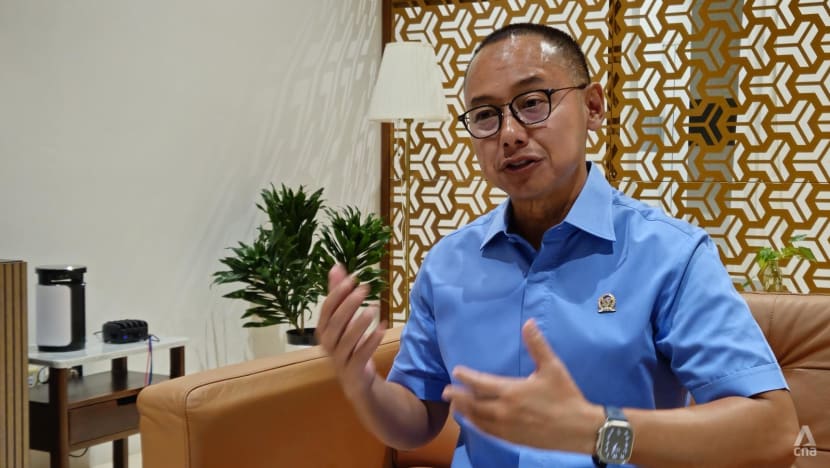
Mr Eddy, the Prabowo campaign spokesperson, said the team will have a few months till June to start discussions with other candidates and parties, if the election goes to a runoff.
Mr Prabowo has the communication skills and experience to negotiate with any political elite, he said, referring to the likes of PDI-P leader Megawati Sukarnoputri and Mr Surya Paloh, who heads the National Democratic Party (Nasdem).
“Political discussions are underway, (there are) political concessions to agree upon, and I think it remains on cards. But our immediate target is to win the elections outright on February 14,” he added.
While Mr Erick said any decision on future cooperation is not his to make, he feels Mr Prabowo will definitely welcome working together with members of the third-placed camp.
“There are many good figures (there), but they must be figures who are not bitter or resentful,” he added.
“Because in order to decide how Indonesia will be next, you cannot use your personal emotions. We have to see what happens in society; don’t try to force your own will.”
Additional reporting by Kiki Siregar


















